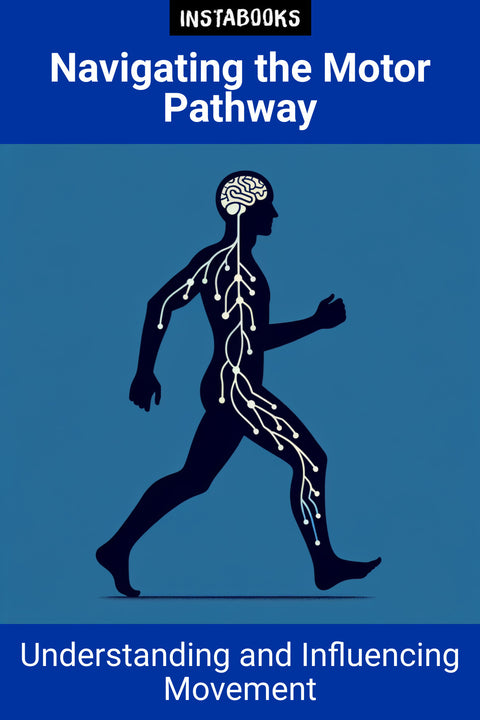
Navigating the Motor Pathway
Understanding and Influencing Movement
Included:
✓ 200+ Page AI-Generated Book
✓ ePub eBook File — read on Kindle & Apple Books
✓ PDF Print File (Easy Printing)
✓ Word DOCX File (Easy Editing)
✓ Hi-Res Print-Ready Book Cover (No Logo Watermark)
✓ Full Commercial Use Rights — keep 100% of royalties
✓ Publish under your own Author Name
✓ Sell on Amazon KDP, IngramSpark, Lulu, Blurb & Gumroad to millions of readers worldwide
$149.00
$299.00
Title
Discover the intricate network of the brain and body that orchestrates every movement. From reflex actions to complex coordinated tasks, 'Navigating the Motor Pathway' offers a deep-dive into the physiological and neurological aspects of motion. Suitable for beginners passionate about biology to experts in neuroscience, this book bridges gaps in knowledge with a strong educational approach.
- The Biology of Motor Pathways
- Neural Circuits and Motor Control
- The Muscle-Skeletal Connection
2. Brain Origins
- Cerebral Cortex and Movement
- The Role of the Basal Ganglia
- Cerebellum and Coordination
3. From Neurons to Action
- Signal Transmission in Neurons
- Synapses and Motor Impulses
- Translating Thought into Motion
4. Reflexes and Automatic Responses
- Understanding Reflex Arcs
- The Spinal Cord and Reflex Actions
- Modulation of Reflexive Movements
5. Fine-tuning Movement
- Precision and Dexterity
- Adaptive Motor Learning
- Skill Acquisition and Mastery
6. Voluntary Versus Involuntary Movement
- Conscious Control of Movement
- Autonomic Functions and Motion
- Psychological Influences on Motor Control
7. Pathological Considerations
- Movement Disorders
- Neurodegenerative Diseases and Motor Function
- Rehabilitation Approaches
8. Pediatric Motor Development
- Milestones in Early Movement
- Factors Influencing Child Motor Skills
- Assessing and Nurturing Motor Growth
9. Aging and Motor Pathways
- Effects of Aging on Movement
- Preventing Motor Decline in Seniors
- Exercise and Brain Plasticity
10. Motor Learning and Memory
- Neural Mechanisms of Motor Memory
- Practice and Retention of Skills
- Cognitive Strategies in Learning Movement
11. Technological Advances
- Neuroprosthetics and Movement Restoration
- Robotics in Motor Rehabilitation
- Brain-Machine Interfaces
12. Future Directions
- Emerging Research in Motor Neuroscience
- Innovative Therapies in Motor Control
- Envisioning the Next Generation of Movement Studies
Table of Contents
1. Foundations of Movement- The Biology of Motor Pathways
- Neural Circuits and Motor Control
- The Muscle-Skeletal Connection
2. Brain Origins
- Cerebral Cortex and Movement
- The Role of the Basal Ganglia
- Cerebellum and Coordination
3. From Neurons to Action
- Signal Transmission in Neurons
- Synapses and Motor Impulses
- Translating Thought into Motion
4. Reflexes and Automatic Responses
- Understanding Reflex Arcs
- The Spinal Cord and Reflex Actions
- Modulation of Reflexive Movements
5. Fine-tuning Movement
- Precision and Dexterity
- Adaptive Motor Learning
- Skill Acquisition and Mastery
6. Voluntary Versus Involuntary Movement
- Conscious Control of Movement
- Autonomic Functions and Motion
- Psychological Influences on Motor Control
7. Pathological Considerations
- Movement Disorders
- Neurodegenerative Diseases and Motor Function
- Rehabilitation Approaches
8. Pediatric Motor Development
- Milestones in Early Movement
- Factors Influencing Child Motor Skills
- Assessing and Nurturing Motor Growth
9. Aging and Motor Pathways
- Effects of Aging on Movement
- Preventing Motor Decline in Seniors
- Exercise and Brain Plasticity
10. Motor Learning and Memory
- Neural Mechanisms of Motor Memory
- Practice and Retention of Skills
- Cognitive Strategies in Learning Movement
11. Technological Advances
- Neuroprosthetics and Movement Restoration
- Robotics in Motor Rehabilitation
- Brain-Machine Interfaces
12. Future Directions
- Emerging Research in Motor Neuroscience
- Innovative Therapies in Motor Control
- Envisioning the Next Generation of Movement Studies
